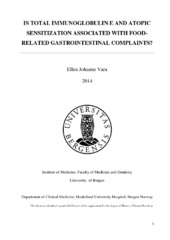Is total immunoglobulin E and atopic sensitization associated with food-related gastrointestinal complaints?
Master thesis
Permanent lenke
https://hdl.handle.net/1956/8191Utgivelsesdato
2014-04-08Metadata
Vis full innførselSamlinger
Sammendrag
Background: We have observed increased number of "IgE-armed" mast cells in duodenal mucosa of patients with food hypersensitivity, and therefore we wanted to explore whether serum total IgE levels and atopic sensitization is associated with food-related gastrointestinal (GI) complaints. Methods: Levels of serum total and specific IgE and GI complaints were measured in 161 patients referred to Section of Clinical Allergology, Haukeland University Hospital, and in a general population sample of 479 persons participating in the Bergen ECRHS. Standard inhalant and food allergens were measured in the patient group, and inhalant allergens of Dermatophagoides pteronyssinus, cat and grass were analyzed in the general population sample. All participants filled out two questionnaires, i.e. irritable bowel syndrome (IBS)-Symptom Severity Scale (IBS-SSS) and IBS-Symptom Questionnaire (IBS-SQ), to assess their GI complaints. Statistical analyzes included bivariate analyzes and multiple regression models. Results: Total IgE was a significant predictor of GI complaints in a total study population (b = .037, p = .001). This was found in the general population (b = .038, p = .005), but did not reach statistical significance in the patient group. Atopic sensitization was inversely associated with GI complaints in both groups, the association was significant in the patient group (b = -77.216, p = .001), but not in the general population. Total IgE and atopic sensitization could together explain 6.2 % of the total variance in GI complaints in the patient group and 1.9 % in the general population. The association of total IgE with GI complaints was consistent among atopic and non- atopic persons, men and women, and across age groups, and no interaction was found by atopic status, sex or age. Conclusion: Serum total IgE was positively associated with GI complaints, while specific IgE was inversely associated with GI complaints. Together, total IgE and atopic sensitization could explain a relatively small proportion of the total variance in GI complaints. The biological mechanisms of food-related GI complaints involving total IgE, but not specific atopic sensitization, warrants further studies.
